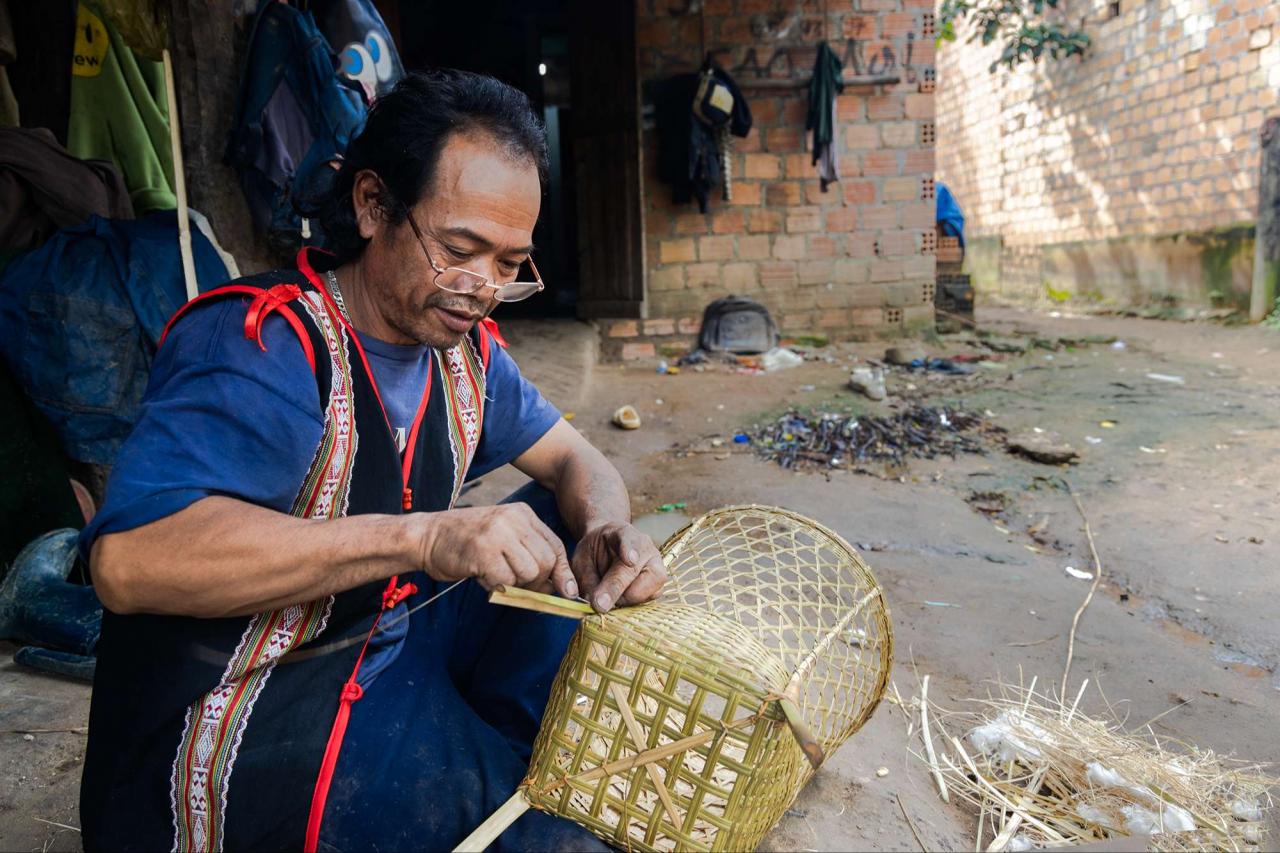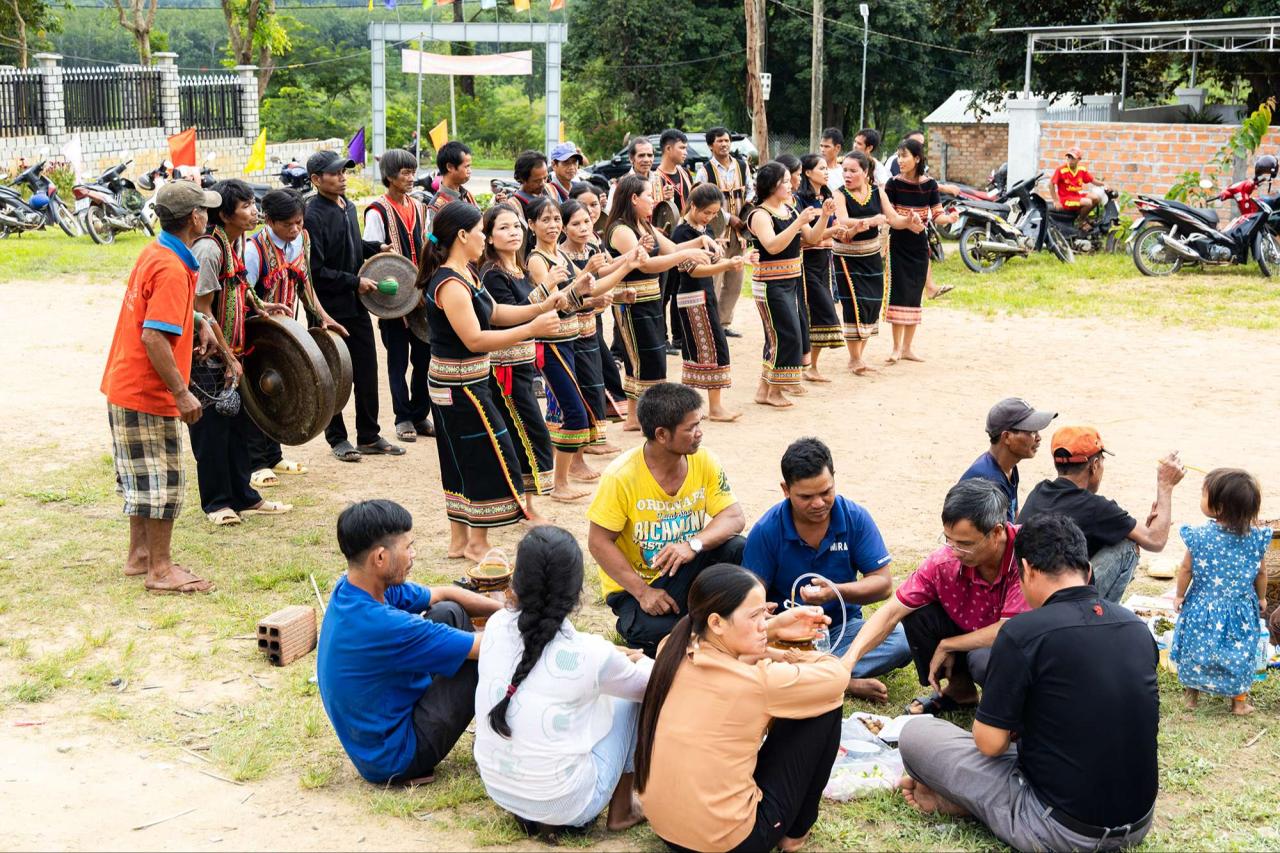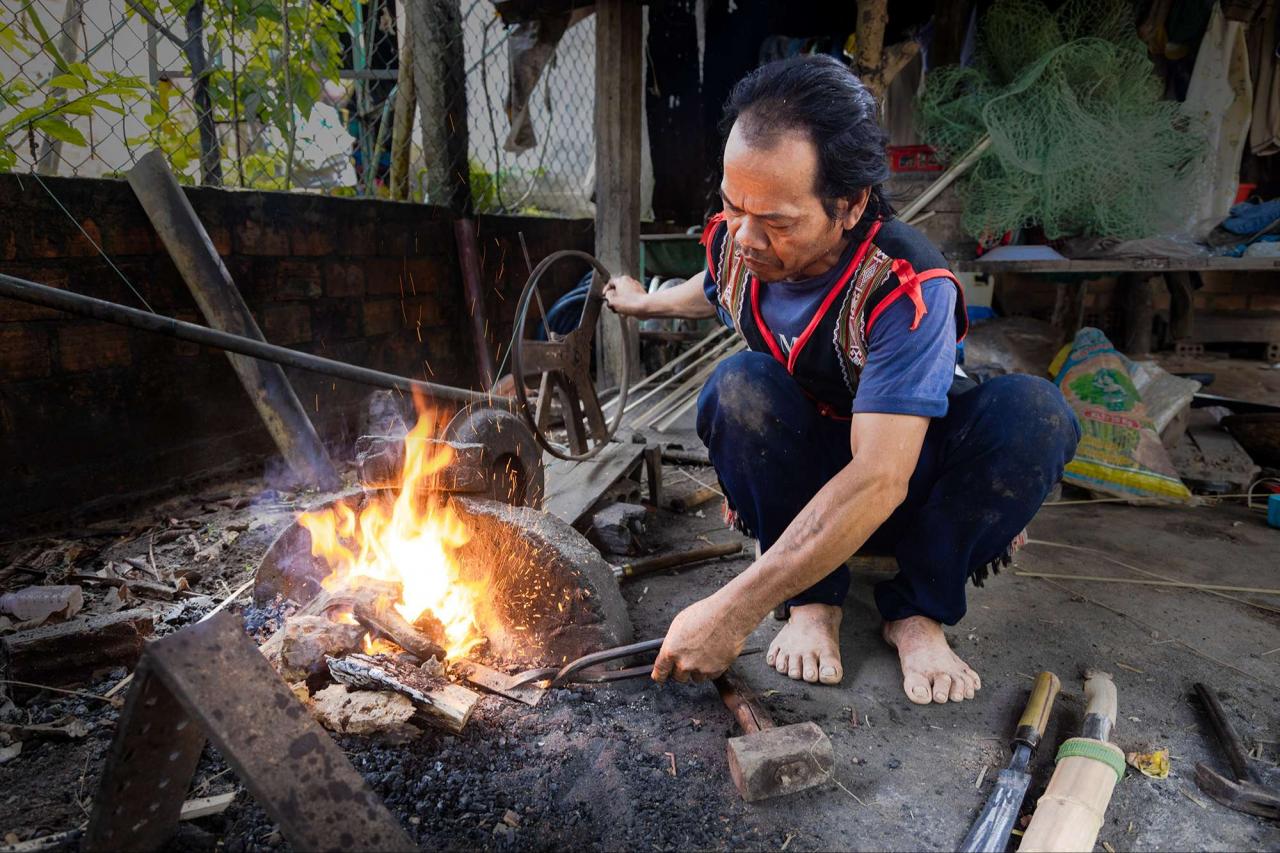Artisan A Par (born in 1969, Kon Xơ Mlũh village, Đăk Tờ Re commune, Kon Rẫy district) is famous for his skillful hands. He can tune gongs, weave baskets, make musical instruments from bamboo and rattan, and forge many tools to serve the production needs of the local people.
Artisan A Par is a member of the Xơ Đăng ethnic group (Tơ Đrá branch) from Kon Rế village, Ngọc Réo commune, Đăk Hà district. In 1988, he got married and moved with his wife to Kon Xơ Mlũh village, Đăk Tờ Re commune, where he has lived ever since.
I met him when the gong ensemble of Kon Xơ Mlũh village was preparing to perform for tourists from Ho Chi Minh City. He said that since childhood he had been taught to play gongs and other musical instruments by previous generations and had practiced diligently. With his quick reflexes and good sense of pitch, he was able to play proficiently in a short time and teach many friends to play as well.
|
Upon settling in Kon Xơ Mlũh village, he quickly adapted to the way gongs were played, learning many traditional gong pieces of the Ba Na people there, thanks to his basic knowledge of Xơ Đăng gongs and his eagerness to learn about the beauty and artistry of the craft. Currently, he is an indispensable member of the gong performances of the Kon Xơ Mlũh village artisans' team. Furthermore, he actively teaches gong playing to many generations in the village.
Mr. A Tan, the village elder of Kon Xo Mluh, said: “A Par is one of the people in the village who knows a lot about gongs. Over the years, he has been very active in guiding and training many generations. Thanks to his dedicated teaching, the gong team has mastered many traditional gong pieces to perform during festivals.”
In recent years, the preservation and promotion of cultural heritage has always received the attention of the Party and the State. Along with the development of community tourism in Dak To Re commune, the gong and Xoang dance troupe of Kon Xo Mluh village has consistently maintained its training, participated in many gong competitions and festivals, and achieved encouraging results. At the first Kon Tum Provincial Ethnic Minority Gong and Xoang Dance Competition in 2022, the Kon Xo Mluh village troupe proudly won second prize overall.
Welcoming us to his home, Mr. A Par enthusiastically recounted: “To play a good gong performance, first and foremost, the gongs must have a clear and resonant sound. Next, the members must play in perfect harmony, rhythmically, and without missing a beat. The performance itself is also very important; facial expressions, posture, and gestures must all be in sync. Especially when combined with the traditional drumming, the rhythm will be perfectly synchronized. Only then can the performance be made more solemn, joyful, and captivating.”
|
Possessing exceptional musical ear, besides being skilled at playing gongs, he also knows how to craft and play many other instruments such as t'rưng, ting ning, and even modern instruments like guitar and drums. Furthermore, he can accurately assess and adjust many gongs that are out of tune. His gong tuning skills are well-known, and many people in the region often ask him to tune their gongs before festivals or village practice sessions.
He is also skilled in weaving and blacksmithing. Currently, his main source of income comes from weaving and blacksmithing. He said that he learned these two trades from his father when he was young. He can make many kinds of everyday items from rattan, bamboo, and reeds for the local people, such as baskets, sieves, and carrying trays. The selling price of these items ranges from 100,000 to 400,000 VND depending on the size and density of the weave. Thanks to his skill, meticulousness, and experience, each of his products has its own unique creativity, with many patterns, neatly interwoven designs, and distinctive decorations that are appreciated by locals and tourists. Typically, to complete one carrying tray, he needs at least 2-3 days to prepare the materials and weave continuously.
Taking us to see the forge area behind his house, craftsman A Par confided: “Thanks to this forge, I make many tools that can support my family and contribute to preserving the traditional craft of my ancestors. Before the Covid-19 pandemic, people from all over came to order forging tools in large quantities, and I had to work continuously to keep up with customer demand. But since the pandemic, the work has slowed down, mainly forging tools for production for people in the village and regular customers who are referred.”
|
The workshop of craftsman A Par is extremely simple, with most of the tools repurposed from readily available materials such as whetstones from the stream and anvils made from the tip of a mortar shell left over from the war. His forged products include various tools for daily life and production, such as shoulder knives, machetes, sickles, and hoes used for forest work and farming. He makes whatever style, pattern, and material a customer requests.
He and his wife often choose to buy steel from car and tractor springs to forge, so their steel is trusted by many for its durability and sharpness.
Sometimes customers bring in pieces of steel from springs, saw blades, or bullet casings to forge knives and machetes, and he accepts them. The processing cost ranges from 150,000 to 250,000 VND; a finished product sells for 150,000 to 400,000 VND. "I work carefully on every detail, paying attention to every line, so customers trust me. They often order traditional jungle knives. This week alone, I made three for customers far away and have a few more orders that I haven't had time to complete yet," artisan A Par happily shared.
During the exchange, Mr. Huynh Quoc Thai, Chairman of the People's Committee of Dak To Re commune, said: Mr. A Par is a multi-talented artisan who has made many contributions to preserving and promoting cultural values and traditional crafts in the locality. In recent years, the preservation and promotion of traditional cultural values has been a priority for the Party committees and government at all levels. Every year, the commune reviews and compiles a list of artisans and implements policies to support, honor, and reward meritorious artisans, encouraging them to actively participate in the preservation and promotion of traditional culture.
Nguyen Ban









![[Photo] Enchanted by the deciduous forest during the leaf-changing season.](/_next/image?url=https%3A%2F%2Fvphoto.vietnam.vn%2Fthumb%2F1200x675%2Fvietnam%2Fresource%2FIMAGE%2F2026%2F02%2F04%2F1770196861704_2066642_8ffd5f25c3c9433be0e644abe71613ae.jpeg&w=3840&q=75)


















![[Photo] Heartwarming "Journey Home for Tet" in the Year of the Horse at the People's Police Academy](/_next/image?url=https%3A%2F%2Fvphoto.vietnam.vn%2Fthumb%2F1200x675%2Fvietnam%2Fresource%2FIMAGE%2F2026%2F02%2F04%2F1770198043990_hv-cong-an-13-1206-jpg.webp&w=3840&q=75)





































![[Photo] Enchanted by the deciduous forest during the leaf-changing season.](/_next/image?url=https%3A%2F%2Fvphoto.vietnam.vn%2Fthumb%2F402x226%2Fvietnam%2Fresource%2FIMAGE%2F2026%2F02%2F04%2F1770196861704_2066642_8ffd5f25c3c9433be0e644abe71613ae.jpeg&w=3840&q=75)

































Comment (0)